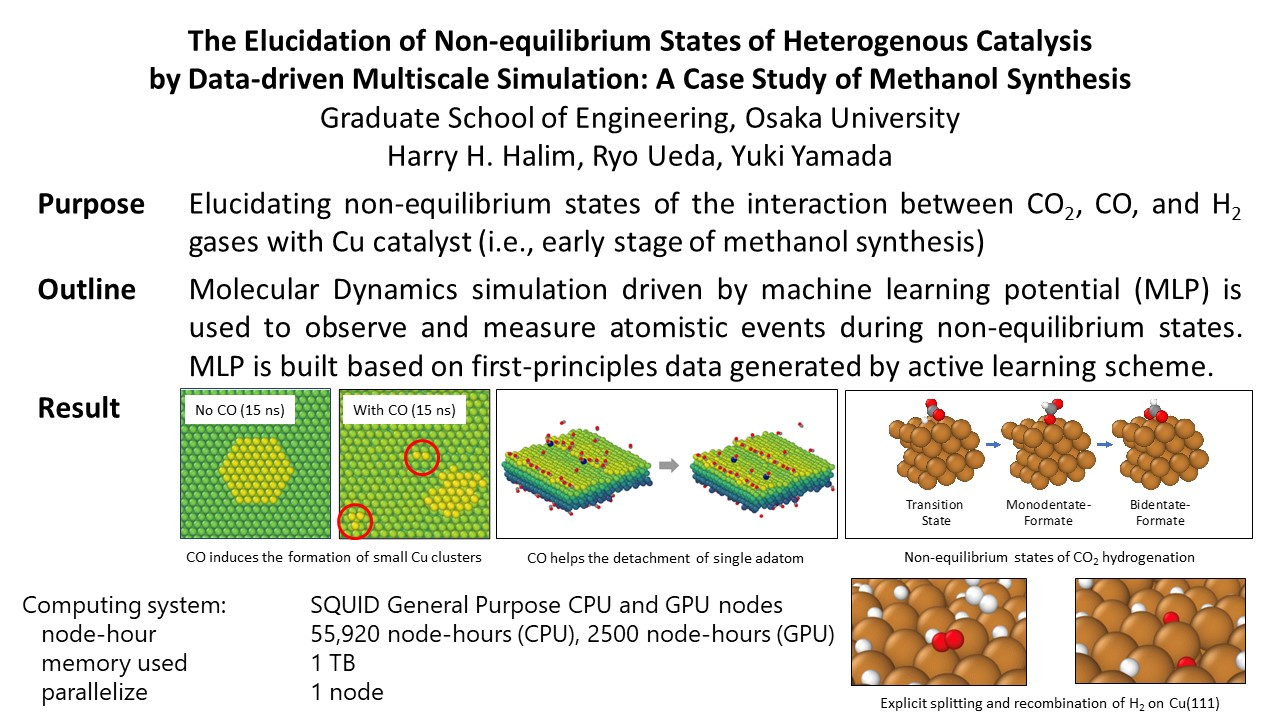Affiliation:Graduate School of Engineering, Osaka University
Abstract:Global warming is world class problem that becomes more worrying over the years. A promising solution comes from the conversion of CO2 (i.e., greenhouse gas) to higher-value chemical such as methanol which can be achieved by heterogenous catalysis. The advantage of this conversion is two-fold: reducing the amount of CO2 in atmosphere and producing methanol which can be used to generate electricity through fuel cell. Understanding the non-equilibrium states (i.e., states when transformation occurs) of catalytic process of methanol synthesis is the key factor in designing the best catalyst. However, observing the non-equilibrium states is inaccessible in most experiments due to the atomistic size and time scale of the events. Though computational approach such as molecular dynamics (MD) can observe detail atomistic events, it suffers from huge tradeoff between speed and accuracy.
In the emergence of data science, it is possible to accelerate the MD simulation while maintaining high accuracy of Density Functional Theory (DFT) level. This can be achieved by machine-learning the energy and forces of atomic structures defined in a set of DFT data. Armed with this framework, we conducted direct observation of non-equilibrium states of initial stage of methanol synthesis including the three main reactants: CO2, CO, and H2 gases. In all cases, we interacted the molecular reactant with Cu surface and directly observe the non-equilibrium events, resulting in the following findings.
(i) CO induces the formation of active Cu clusters on Cu stepped surface by increasing frequency of single adatom detachments from step edge.
(ii) The successful hydrogenation of CO2 is affected by the initial conditions of the gas such as vibrational modes, vibrational energy, incident angle, and incident target. The best conditions leading to the successful hydrogenation is tabulated.
(iii) The accurate modelling of Cu nanoparticle interaction with hydrogen gases is ongoing.
Publication related to your research:
(Domestic conference/wokrshop)
- Ryo Ueda, Harry H. Halim, Yoshitada Morikawa, “機械学習分子動力学法によるCO吸着したCuステップ表面の再構成の解析”, presented in 2023 Spring Conference of JPS (The Physical Society of Japan), Mar. 2023.
- Harry H. Halim, Yoshitada Morikawa, “Machine Learning Molecular Dynamics Simulation of CO2 Hydrogenation to Formate on Cu(111) Surface”, presented in 2023 Spring Conference of JPS (The Physical Society of Japan), Mar. 2023.
Posted : March 31,2023


